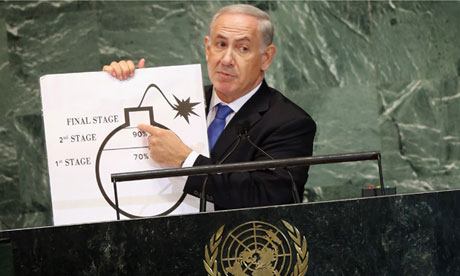Iran steps up pace and capacity of uranium enrichment, says IAEA report
Israel’s ‘red line’ could be hit in June, the point when Iranians have enough 20%-enriched uranium to produce a warhead
- guardian.co.uk, Friday 16 November 2012 19.15 GMT

Iran has expanded its enrichment capacity and is enriching uranium at a pace that would bring it to what Israel has declared an unacceptable red line in just over seven months, according to a report by the UN nuclear watchdog.
The International Atomic Energy Agency also found that Iranian technicians had removed the fuel rods from the country’s only functioning nuclear power station at Bushehr, suggesting the new reactor has serious problems. Iran did not tell IAEA inspectors what those problems were.
The IAEA quarterly report on Iran’s nuclear programme was released just days before the expected launch of a new diplomatic initiative to resolve the international impasse over the issue.
It also comes soon after Israeli official stated that the red line drawn by Israel’s prime minister, Binyamin Netanyahu, during his UN appearance in September, represented 240kg of 20%-enriched uranium, enough to make a warhead if further enriched to weapons grade.
The sensitivity of 20% uranium figure is that it can be turned into weapons grade relatively fast and easily.
The last time the IAEA inspectors drew up a report, three months ago, Iran had made 189kg of 20% uranium but had used nearly 100kg for civilian purposes, leaving an outstanding 96kg.
In the last three months, that stockpile has grown by 43kg and Iran has not diverted any more of it to civil uses. At the current steady rate of production, that would bring Iran to the Israeli red line by mid-June. But it also installed new centrifuges at its underground enrichment plant in Fordow, with which it could double its rate of production if it chose to do so.
However, it could also decide to divert more uranium to civilian uses, or – as western diplomats hope – strike a deal, exchanging 20% uranium for sanctions relief, and thus defuse the crisis.
Diplomats from six major powers are due to meet next week to discuss a common negotiating strategy as an expected prelude to restarting high-level talks with Iran at about the end of this month.
